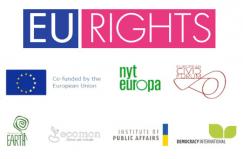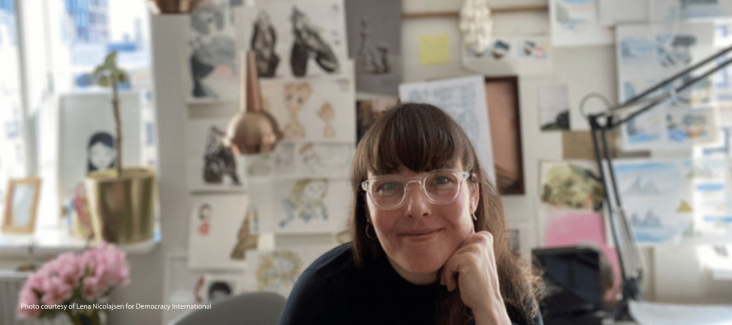“We wanted to develop this Art of Fundamental Rights project because we have experienced that a lot of citizens find it hard to talk about different political subjects like rights. When talking through art, one does not have a right or wrong answer, interpretation is key, which makes it easier to talk about complex topics. With the Art of Fundamental Rights, we want to raise awareness about our fundamental human rights through art, because they continue to be under attack in several countries. We are seeing these developments all over the world, including in Europe, where authoritarian regimes exercise power over minorities and vulnerable groups” says Sarah Terkelsen, the project manager of the Art of Fundamental Rights from Danish organisation Nyt Europa.
chARTer in very simple terms is an exhibition of 13 different artworks by European artists who each interpreted one chapter of the Charter of Fundamental Rights of the European Union in their very own style. Over the last two years, the project united six European partner organisations and 13 artists from the respective countries to communicate fundamental rights through art.
During the exhibition in the Europe Dome, I had the chance to ask Sarah Terkelsen about the ideas behind the projects. I also had the pleasure of talking to Lena Nicolajsen, the artist from Denmark who interpreted the “Freedoms” chapter of the Charter of Fundamental Rights about the feeling of freedom and the role that art can play in political conversations.
Your art is about freedom. What does it mean to you and what do fundamental rights mean to you?
Lena: I think freedom is not only a core value in the fundamental rights of human beings, but it is also a core value in my personal life. When I got the assignment, I was thinking a lot about the feeling of freedom, which was more important for me to convey. I think we all know the feeling of freedom if we have been lucky enough to have tried it. Heading out somewhere, some new place and the feeling of immense freedom. Or travelling to places where you are not sure what is going to happen, you don’t have any connections to the place or the people, so you have this freedom when you get to know yourself.
Freedom and human rights are so specific and detailed, and I think it is very hard to communicate that through a single image. It would take a lot of words, and I tried to write a lot on the imagery, but it looked so cluttered and just not right. So, I went back to the feeling of flying free.
Tell us about your artwork and how to interpret it, please.
Lena: The artwork is a lot of birds flying through a pink sky. I wanted to convey the feeling of flying free. Actually, one of the first sketches that I made was a field of flowers with the feeling of growing free. But we ended up choosing the other version, I think, because of the way I feel when I think about freedom. Without ever being able to experience it, we as human beings can imagine flying and the freedom it gives.
What was your inspiration?
Lena: When you read the paragraph and think about human rights, there is so much complexity, so many groups of people who need rights that they don’t have or they have and take for granted. It is so complex that I wanted to do something so simple that just has the feeling in the imagery. It is always hard to work with complex matters.
Human rights are complex and every country is in a very different place regarding them, and I believe it is my assignment to express it in a way as simple and clean as possible.
How do you think art can contribute to the discussion of rights?
Lena: It is very funny because when I started in art, I thought it is a very selfish, self-absorbed profession. Like, I like to draw, so now I draw. But sometimes when illustration has touched somebody, they tell me. So, they see the influence of this profession from outside.
I think it is a very underestimated way of communicating with people through art. There are so many functions in our world and so little place for the things that just give people joy, that don’t have holistic functions. Art doesn’t give you freedom or heat your home, but it gives joy. I also think that art is within most people. All children draw, they just stop at some point.
Sarah: Art invites people into important conversations by being an alternative way of discussions about fundamental rights. It makes it easier for people to talk about the topic and for them to realise that there is still a fight going on and that we therefore can’t take our rights for granted as we see the fundamental rights of every human beings are being threatened in these years – also in Europe. Art of Fundamental Rights is telling people that it is important to know your rights and fight for your rights and the rights of those less fortunate.
Do you have any tips on how people can contribute to political discussions through art?
Lena: Right now, even though we say so many things are so bad, art is a free platform where you can express yourself. I think one can contribute through art by making art of the things they want to change. A lot of artists supported the women of Iran who lose fundamental rights every day. I know artists from Egypt and Iran who have had the feeling of a lack of rights in their lives. I know they do a lot, and I hope this generation can turn the boat, but only the future will tell.
Sarah: The thing that people can do through art regarding political discussions is to hang the artworks on their walls and use the artworks as the starting point for political and rights and value-based discussions. When we talk to each other, to our family and friends, the conversation spreads, and we will get the message across to keep on fighting for our rights and the rights of others.


